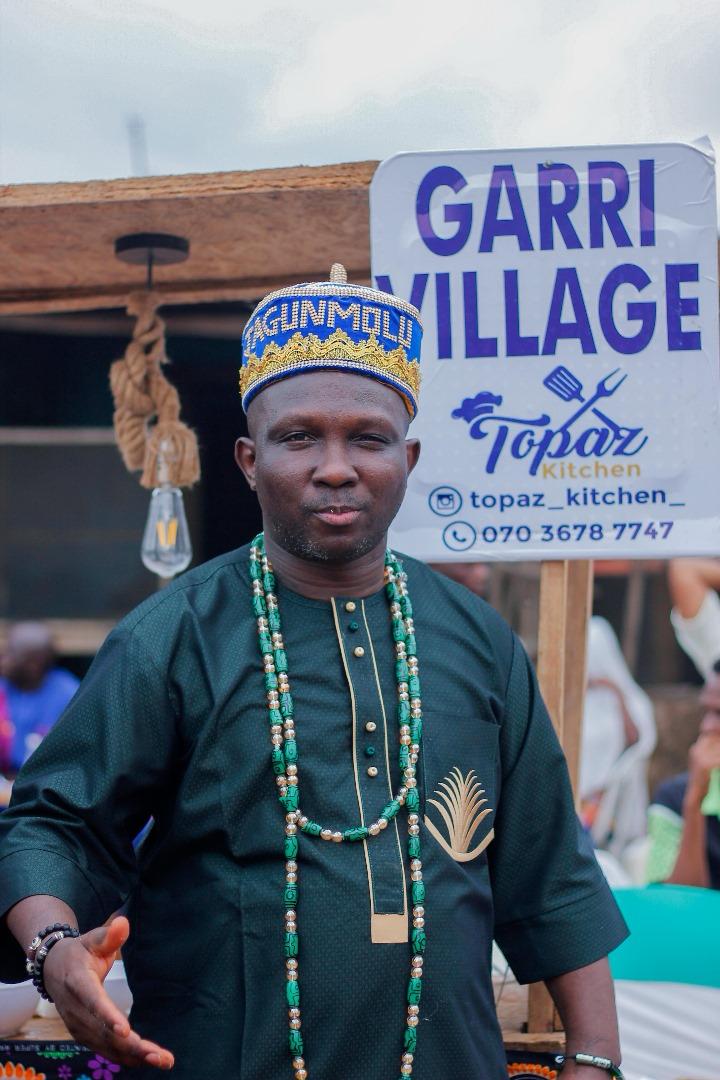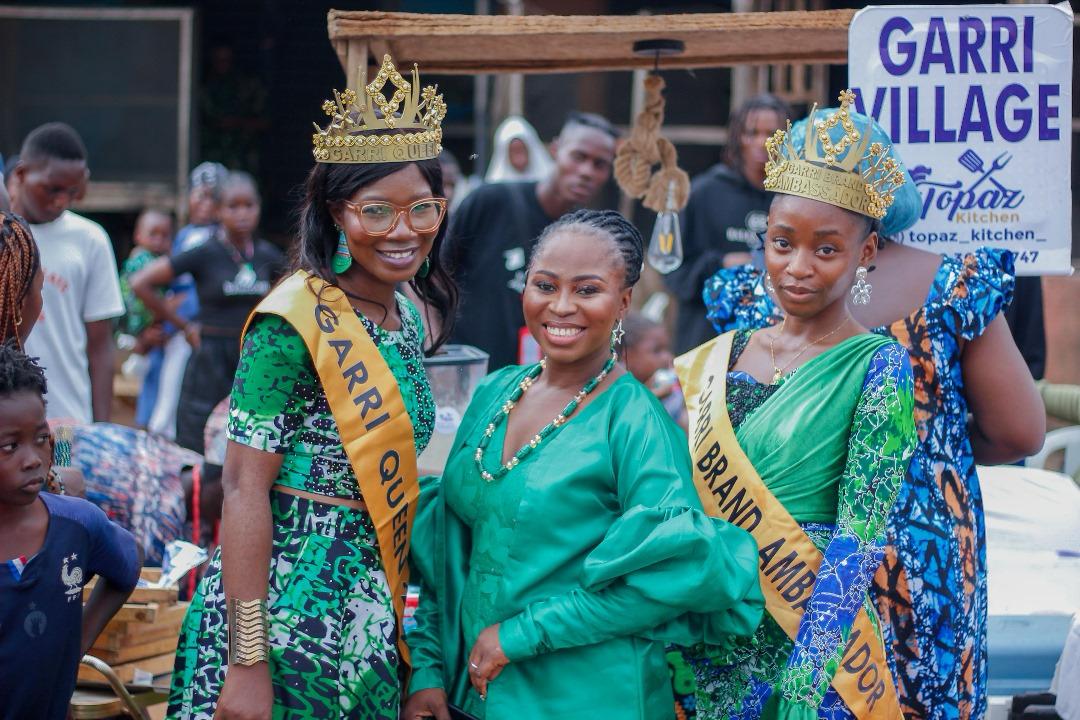Business
Garri Day Festival Targets Unity, Diversity Through Food – Obani Boyede*

*Garri Day Festival Targets Unity, Diversity Through Food – Obani Boyede*
Chief Obani Oluwabiyi Anthony Boyede Greenlyte, founder of Theatre Centrik and organiser of the 2024 African Food and Drinks Festival, Garri Day, revealed that the event was intentionally crafted to use food as a means of fostering national unity, cohesion, and diversity in Nigeria while addressing issues of ethnicity, tribalism, and disunity.
Boyede, a cultural advocate who also leads the Alimosho Arts Community Initiatives (AACI) in the Alimosho area of Lagos State, noted that the celebration would also contribute to development, as cohesion and unity are vital for national growth and advancement.
In an interview with THECONSCIENCE NG, the multi-talented thespian, traditionalist, cultural ambassador, and performance theatre icon shared insights during the annual event in Lagos over the weekend.
He reiterated his commitment to celebrating African culture with a special emphasis on Garri, a staple of African cuisine.
He stated, “The event was centered around cultural promotion and capacity building. We are celebrating the African Food and Drinks Festival, tagged Garri Day 2024. We leveraged the importance of food as a source of unity, bringing people together regardless of age or race, without discrimination, using Garri as a common denominator. We are promoting diversity across the nation. This is the 19th edition; we organise it year-round and promote our culture through various initiatives. We also host other cultural festivals under the Alimosho Arts Community Initiatives.”
Looking ahead, Boyede expressed his vision for the next five years: “We aim to establish an empire where children can acquire general academic knowledge alongside African culture. We envision a school that incorporates Ifa and the total culture of Africa alongside essential subjects. That’s why we have established the University of Kulture as an academic institution to drive this mission.”
The event was held in partnership with the Lagos State Tourism Board, the University of Kulture, Alimosho Arts Community Initiatives (AACI), and other esteemed organisations.
Regarding community acceptance, he shared, “This is a community-based programme, and we have seen great turnout, as evidenced by the attendance at our summer programme. Although financial support is limited, we are persevering. Participants are enjoying it and they remain enthusiastic.”
On the support from the state government, he praised Hon. Toke Benson, the Lagos State Commissioner for Culture and Tourism, for her endorsement of the forthcoming cultural fest, which he described as the mother of all festivals, and will take place at the same venue on November 16-17 this year to conclude the year’s activities.
“Frankly, a lack of funding has been a long-standing challenge from the Lagos State government, but this year we have received their support, for which we are very grateful. We are moving forward and not slowing down.”
Temitope Ojubanire, the Garri Queen 2024, remarked on the festival’s impact on the community, stating, “The food and culture festival, Garri Day, has been amazing, evident in the quality of people who turned out.”
She added, “Garri is a beloved staple that transcends food. It is recognided globally, from America to Africa, and symbolises love, unity, and cultural heritage. That’s why we celebrate culture through Garri, a cherished food staple among various tribes in Nigeria, enjoyed in different forms, including Koro and eba.”
Discussing the children’s participation, she reflected, “Events like this create lasting memories not only for adults but for kids as well. Growing up, I remember attending events with my mother, where I learned invaluable lessons that continue to inspire me to give back to society.”
Approximately 1,000 children participated in dance, competitions, songs, and cultural activities, showcasing exhibitions from Yoruba, Igbo, Efik, South African cultures, and others.
Speaking further, Ojubanire said she plans to engage further with the community, meeting children and stakeholders to promote cultural awareness through Garri, advocating for love and humanity as a volunteer and one of the visionaries at the Alimosho Arts Community Initiatives (AACI) and University of Kulture.
The event, which held on August 24th, provided attendees with a day filled with cultural activities, including various Garri drinking and eba eating competitions, dance and drama performances, and numerous exhibitions.
The festival showcased a variety of Garri from across Africa, including Ijebu Garri with its fine texture and sweet taste, Ghanaian Garri with its spiced blend, Cameroonian Garri known for its crunchy texture and rich aroma, and traditional Nigerian Garri.
In addition to the culinary delights, the event featured a lineup of notable guests, including veteran actors, traditional rulers, and key figures from the Lagos State Government and the Ministry of Tourism.
Business
Nigeria’s Inflation Drops to 15.10% as NBS Reports Deflationary Trend

Nigeria’s headline inflation rate declined to 15.10 per cent in January 2026, marking a significant drop from 27.61 per cent recorded in January 2025, according to the latest Consumer Price Index (CPI) report released by the National Bureau of Statistics.
The report also showed that month-on-month inflation recorded a deflationary trend of –2.88 per cent, representing a 3.42 percentage-point decrease compared to December 2025. Analysts say the development signals easing price pressures across key sectors of the economy.
Food inflation stood at 8.89 per cent year-on-year, down from 29.63 per cent in January 2025. On a month-on-month basis, food prices declined by 6.02 per cent, reflecting lower costs in several staple commodities.
The data suggests a sustained downward trajectory in inflation over the past 12 months, pointing to improving macroeconomic stability.
The administration of President Bola Ahmed Tinubu has consistently attributed recent economic adjustments to ongoing fiscal and monetary reforms aimed at stabilising prices, boosting agricultural output, and strengthening domestic supply chains.
Economic analysts note that while the latest figures indicate progress, sustaining the downward trend will depend on continued policy discipline, exchange rate stability, and improvements in food production and distribution.
The January report provides one of the clearest indications yet that inflationary pressures, which surged in early 2025, may be moderating.
Bank
Alpha Morgan to Host 19th Economic Review Webinar

Alpha Morgan to Host 19th Economic Review Webinar
In an economy shaped by constant shifts, the edge often belongs to those with the right information.
On Wednesday, February 25, 2026, Alpha Morgan Bank will host the 19th edition of its Economic Review Webinar, a high-level thought leadership session designed to equip businesses, investors, and individuals with timely financial and economic insight.
The session, which will hold live on Zoom at 10:00am WAT and will feature economist Bismarck Rewane, who will examine the key signals influencing Nigeria’s economic direction in 2026, including policy trends, market movements, and global developments shaping the local landscape.
With a consistent track record of delivering clarity in uncertain times, the Alpha Morgan Economic Review continues to provide practical context for decision-making in a dynamic environment.
Registration for the 19th Alpha Morgan Economic Review is free and can be completed via https://bit.ly/registeramerseries19
It is a bi-monthly platform that is open to the public and is held virtually.
Visit www.alphamorganbank to know more.
Business
GTBank Launches Quick Airtime Loan at 2.95%

GTBank Launches Quick Airtime Loan at 2.95%
Guaranty Trust Bank Ltd (GTBank), the flagship banking franchise of GTCO Plc, Africa’s leading financial services group, today announced the launch of Quick Airtime Loan, an innovative digital solution that gives customers instant access to airtime when they run out of call credit and have limited funds in their bank accounts, ensuring customers can stay connected when it matters most.
In today’s always-on world, running out of airtime is more than a minor inconvenience. It can mean missed opportunities, disrupted plans, and lost connections, often at the very moment when funds are tight, and options are limited. Quick Airtime Loan was created to solve this problem, offering customers instant access to airtime on credit, directly from their bank. With Quick Airtime Loan, eligible GTBank customers can access from ₦100 and up to ₦10,000 by dialing *737*90#. Available across all major mobile networks in Nigeria, the service will soon expand to include data loans, further strengthening its proposition as a reliable on-demand platform.
For years, the airtime credit market has been dominated by Telcos, where charges for this service are at 15%. GTBank is now changing the narrative by offering a customer-centric, bank-led digital alternative priced at 2.95%. Built on transparency, convenience and affordability, Quick Airtime Loan has the potential to broaden access to airtime, deliver meaningful cost savings for millions of Nigerians, and redefine how financial services show up in everyday life, not just in banking moments.
Commenting on the product launch, Miriam Olusanya, Managing Director of Guaranty Trust Bank Ltd, said: “Quick Airtime Loan reflects GTBank’s continued focus on delivering digital solutions that are relevant, accessible, and built around real customer needs. The solution underscores the power of a connected financial ecosystem, combining GTBank’s digital reach and lending expertise with the capabilities of HabariPay to deliver a smooth, end-to-end experience. By leveraging unique strengths across the Group, we are able to accelerate innovation, strengthen execution, and deliver a more integrated customer experience across all our service channels.”
Importantly, Quick Airtime Loan highlights GTCO’s evolution as a fully diversified financial services group. Leveraging HabariPay’s Squad, the solution reinforces the Group’s ecosystem proposition by bringing together banking, payment technology, and digital channels to deliver intuitive, one-stop experiences for customers.
With this new product launch, Guaranty Trust Bank is extending its legacy of pioneering digital-first solutions that have redefined customer access to financial services across the industry, building on the proven strength of its widely adopted QuickCredit offering and the convenience of the Bank’s iconic *737# USSD Banking platform.
About Guaranty Trust Bank
Guaranty Trust Bank (GTBank) is the flagship banking franchise of GTCO Plc, a leading financial services group with a strong presence across Africa and the United Kingdom. The Bank is widely recognized for its leadership in digital banking, customer experience, and innovative financial solutions that deliver value to individuals, businesses, and communities.
About HabariPay
HabariPay is the payments fintech subsidiary of GTCO Plc, focused on enabling fast, secure, and accessible digital payments for individuals and businesses. By integrating payments and digital technology, HabariPay supports innovative services that make everyday financial interactions simpler and more seamless.
Enquiries:
GTCO
Group Corporate Communication
[email protected]
+234-1-2715227
www.gtcoplc.com
-

 celebrity radar - gossips6 months ago
celebrity radar - gossips6 months agoWhy Babangida’s Hilltop Home Became Nigeria’s Political “Mecca”
-

 society6 months ago
society6 months agoPower is a Loan, Not a Possession: The Sacred Duty of Planting People
-

 society5 months ago
society5 months agoReligion: Africa’s Oldest Weapon of Enslavement and the Forgotten Truth
-

 news6 months ago
news6 months agoTHE APPOINTMENT OF WASIU AYINDE BY THE FEDERAL GOVERNMENT AS AN AMBASSADOR SOUNDS EMBARRASSING






